| September 4, 2022 - No. 11 In the
News
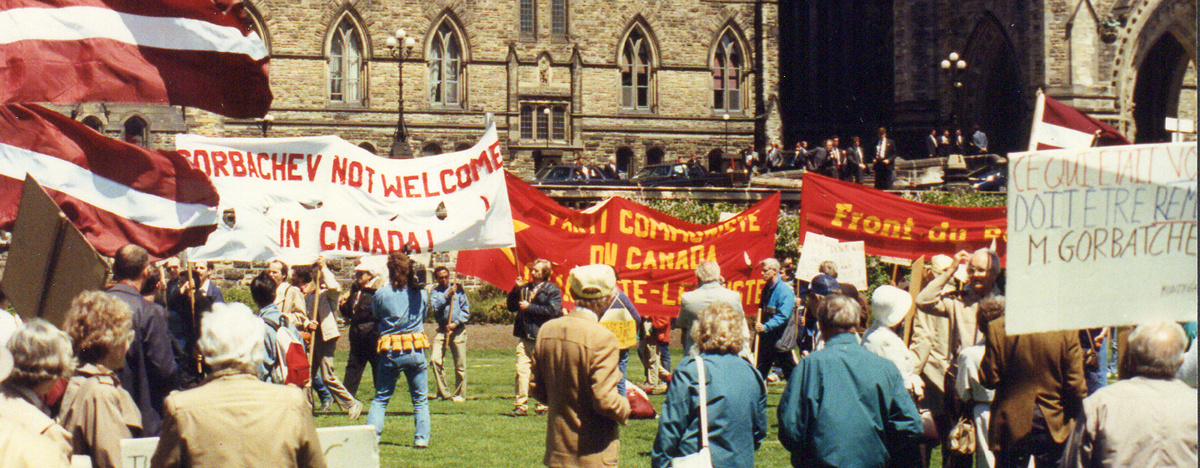
Demonstration on
Parliament Hill against Gorbachev's visit to Canada, May 30, 1990.
From
the Writings of Hardial Bains
• Failure
-
January 17, 1989 - • Revolution
- October 4, 1989 -
• Developments in Russia: The Raising of
the Flag
- December 26, 1991 -
In the News The Death of
a Restorationist 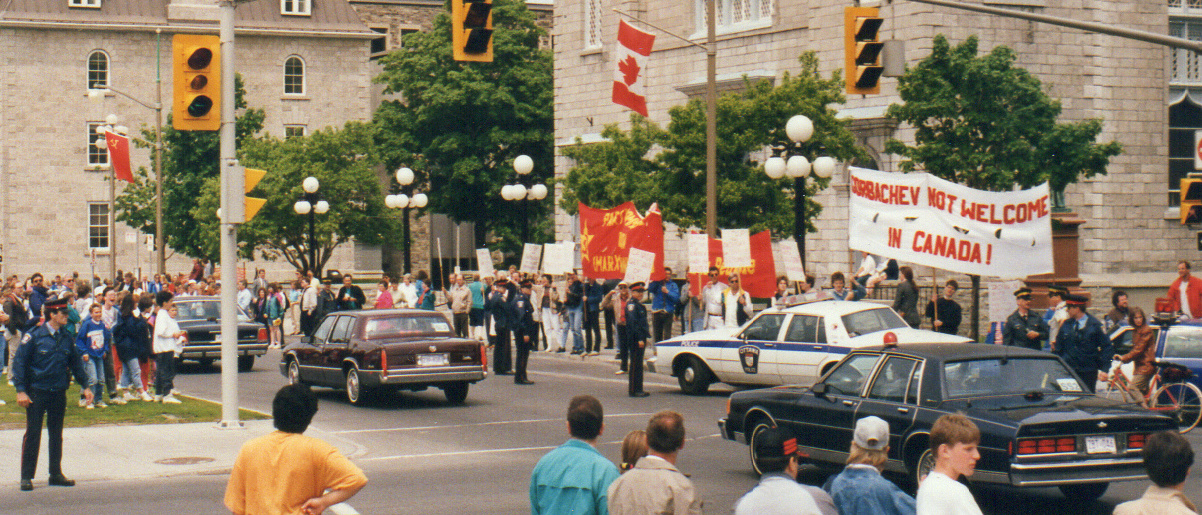
The
simple truth about Mikhail Gorbachev who died on August 30 and about
whom much noise is heard, is that he was a restorationist, nothing
more. His achievement was to make every prize-fighter of the Old World
extremely cocky and confident that their greatest nightmare, that of
the 1917 Great October Revolution, had come to an end. No matter what is said about
Mikhail Gorbachev on the occasion of his death -- from accolades to
critical pseudo analyses of the role he played in the subsequent
collapse of the Soviet Union -- nothing can erase the colossal
achievements of the Great October Socialist Revolution and the Soviet
Union from the minds of the peoples of the world. The euphoria of the
Anglo-American imperialists at the fall of the Soviet Union was to no
avail. Today, their nightmares and morbid preoccupation with defeat are
greater than ever as they wreak vengeance on their rivals and the
peoples of the world. The
Great October Revolution of 1917, on the other hand, was an event of
colossal historic significance. The name of the Soviet Union, its birth
and development, have always been connected with the names of V.I.
Lenin and J.V. Stalin. The Great October Revolution which took place
105 years ago this year under the leadership of V.I. Lenin, created the
conditions for the development of Soviet power, which put power in the
hands of the people. Soon afterwards, the Soviet Union came into being
on the basis of this power on December 30, 1922 -- 100 years ago this
year. Socialism was constructed in the Soviet Union. 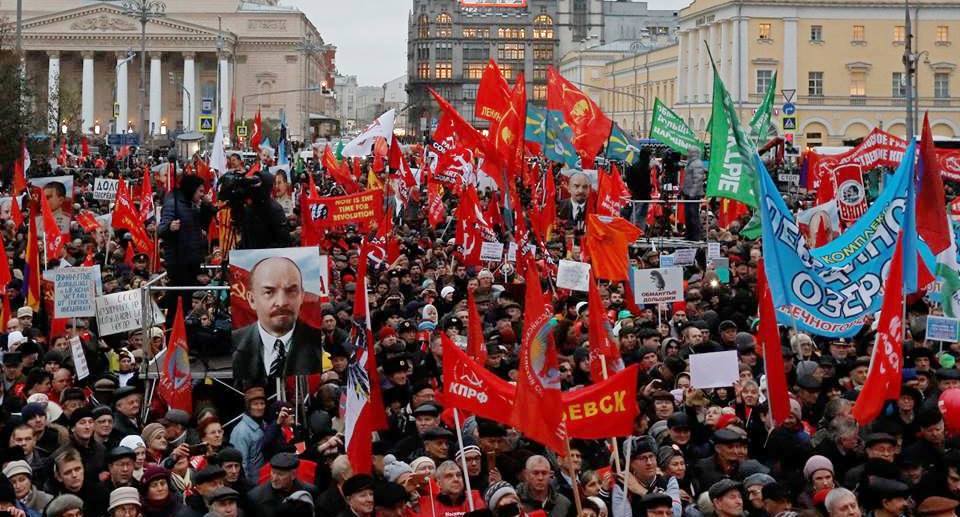
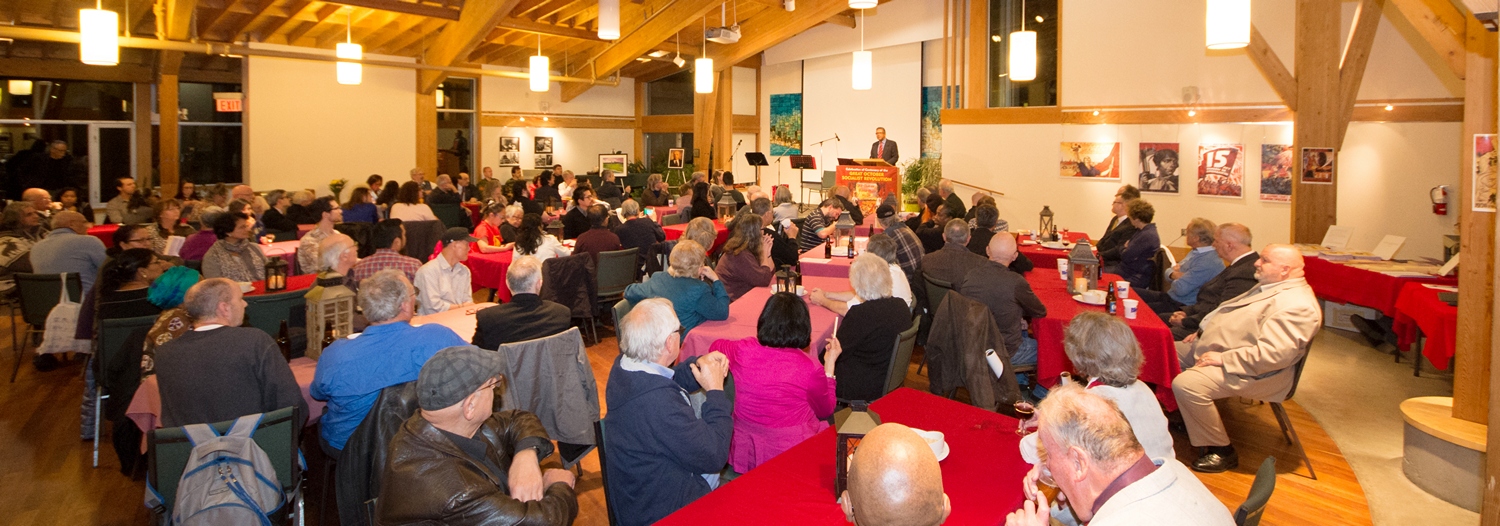
Celebrations in 2017
marking the 100th anniversary of the Great October Revolution in cities
across Canada and around the world reflect its historic significance to
this day.
Top photo is from Russia where communist
organizations were joined by representatives of political parties and
democratic and progressive organizations from more than 80 countries.
Bottom photo is from Toronto.
Besides
other things, the Soviet Union was industrialized with unprecedented
speed. Revolution unleashed the productive forces which were either
lying dormant, chained hand-and-foot under the feudal rule of the
czars, or were being squandered. The Great October Revolution of 1917
dispossessed the czars and their retinues of their aristocratic and
feudal properties, titles and privileges. Since then, their descendants
had dreamed and worked for restoration with every fibre of their being.
And, seventy years later, along came Mikhail Gorbachev to champion
their cause in the name of high ideals, like “real
democracy.” While the Great October Revolution shook the
Old World and brought a New World into being, Mikhail Gorbachev's great
achievement was to organize counterrevolution which sent waves of glee,
joy and euphoria throughout the Old World. He was hailed as a new Lenin
who, in the name of glasnost and perestroika (openness and
restructuring) was organizing the greatest revolution in the Soviet
Union. However, unlike Lenin, he was loved by the Old World. When
Gorbachev came along, everything Lenin stood for was mercilessly
attacked under the guise of attacks against J.V. Stalin. The diabolical
aim was complete restoration of a classical capitalist society which
pleased the Old World and led to the destruction of the Soviet Union. Naturally,
the question comes to mind: What is a revolution? The notion people
have of a revolution is of some oppressive power or backward system
being overthrown. The Russian czars were oppressive powers and their
system was backward and they were overthrown. What did Mikhail
Gorbachev achieve? He managed to get whatever was left of socialism in
the Soviet Union overthrown in the name of "leaving the past behind."
Only by restoring classical capitalism could the Soviet Union compete
with the U.S. superpower, he declared. The world bourgeoisie feverishly
championed his cause to bring the Soviet Union into the world market.
They brought about changes to build classical capitalism in order to
seize the human productive forces of the former Soviet Republics and
former people's democracies in Eastern Europe. Just as
Gorbachev’s promise of a “bright future,” never
materialized, so too the promise of then President Bush,
Britain’s Thatcher and others for a “peace dividend,”
also never materialized. Indeed, there have been more U.S.
interventions since the end of the Cold War than during it. Pentagon
spending is more than $1 trillion yearly, and the U.S. is demanding yet
more military spending by Canada and Europe. The fact is that not only did
the overthrow of socialism through counterrevolution lead to the
collapse of the Soviet Union itself but, thirty years later, the
results can be seen in the extremely dangerous situation which exists
today for the peoples of the former Soviet Republics, all of Europe and
the world. Before
Gorbachev, the Soviet Union had already emerged as an imperialist
superpower and contender with U.S. imperialism for the domination of
the world. The collusion and contention between the two superpowers was
already enveloping the world in crises and wars of aggression, with
both calling for change to manipulate the demand of the peoples for
change which favours them, not the rich. What kind of change, the
content of the change required, became the issue of paramount
importance and continues to be to this day. The victory of the Great October
Revolution signalled the end of the First World War, a terrible war
which was fought between imperialist countries for the re-division of
the world. The "revolution" of Mikhail Gorbachev seventy years later
brought the world closer to the terrible world war the Anglo-American
imperialists and their collaborators and appeasers are organizing
today, much more destructive and cataclysmic than any other war.
Counterrevolution in the former Soviet Union was accompanied
with counterrevolution in all the capitalist countries which took up
the neo-liberal anti-social offensive with its denial of the existence
of society and negation of social responsibility and the need to uphold
the rights of all by virtue of being human. The
essence of the worldwide neo-liberal counterrevolution and offensive
was and continues to be to restructure the state. This has plunged the
world into a crisis of anarchy and violence of proportions hitherto
unknown. By politicizing the narrow private interests of the oligarchs
and their oligopolies, all hitherto legislative limitations on the
exercise of the police powers in the hands of presidents, prime
ministers and cabinets are removed. Governments of police powers now
reign supreme through elections so fraudulent they are seen to be
nothing more than a means to usurp power by one or another faction in
the civil wars which are raging in the desperate fight of the rich to
get richer by leaps and bounds. They persist no matter the
impoverishment of ever greater numbers of people, with the destruction
of human productive forces which they cannot control at a faster and
faster pace through nation-wrecking and wars of aggression and
occupation abroad and civil wars at home. From the outset,
Gorbachev gave the impression of being a huckster politician and a
demagogue who said one thing and did another. For example, he said that
his reforms were designed to build "real socialism." In actual fact,
they enabled the building of a classical capitalist system. He claimed
that by opening up, his reform was designed to establish "real
democracy." In actual fact, he completed the process of depriving the
working class of any say in the running of society and permitted the
takeover of the state and institutions by a new bourgeoisie, the rich
and powerful in the economy, party and state. Mikhail Gorbachev said he
was for peace, but the result was more preparations for war. Today,
thirty years later, all his admirers are such huckster politicians,
purveyors of historical falsifications for purposes of perpetrating
historical fraud -- which is to say that their dream of depriving the
peoples of the world of their own sovereign political power persists.
The claim that Mikhail Gorbachev was the new Lenin was
mind-boggling then just as the claims of the rulers today that their
restoration of the dregs of nazis, fascists and Japanese militarists
can prevail are also mind-boggling. The old Lenin was a Bolshevik, an
orthodox Marxist, a revolutionary and a humanitarian, an architect of
peace and freedom, an organizer of revolution and builder of socialism.
The so-called new Lenin emerged as a rehash of the old Russian Cadet of
the time of Lenin, a liberal who seeks to retain power by providing it
with constitutional legitimacy despite its anti-people essence.
The whole world knew the real V.I. Lenin and his true work and
it knew the feats of J.V. Stalin, while Mikhail Gorbachev was only to
be found in the corridors of secret world diplomacy. Only the likes of
Ronald Reagan, Margaret Thatcher and their secretaries of state and
foreign ministers really knew for sure where Mikhail Gorbachev stood.
From revolution to counterrevolution, history has its own
twists and turns. But one thing that is certain is that humankind will
always look back to the days of October of the year 1917 when the
salvoes were fired which marked the dawn of the New World. Despite
all the prizes conferred on Mikhail Gorbachev by the most reactionary
champions of world reaction, he will forever remain a blip on the
screen of history, a passing episode signifying nothing. The spectre of
communism continues to haunt the restorationists as the peoples of the
world strive for their own empowerment, to speak in their own name and
create raisons d'état which vest sovereignty in the people,
not the rich. We can say with certainty that history will again see
revolutions of the calibre of the Great October Revolution, and youth
of today will continue to proudly use the teachings of Karl Marx,
Frederick Engels, V.I. Lenin and J.V. Stalin as a guide to action so as
to turn historic successes into historic victory. 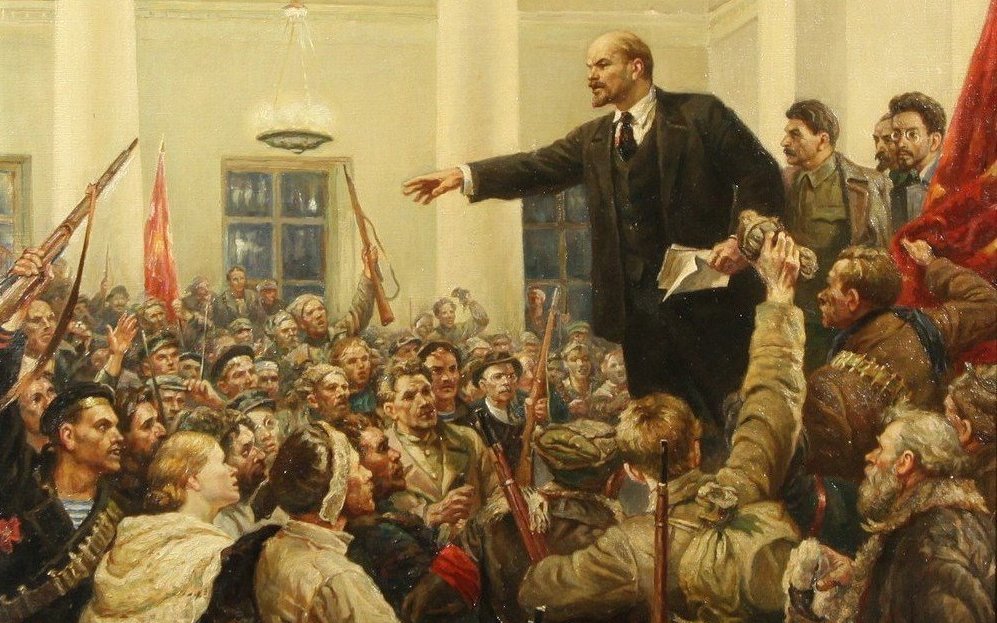
Lenin
proclaims Soviet power in Smolny Palace, Petrograd, 1917.
(Original painting by Vladimir
Serov in 1947) 
From
the Writings of Hardial Bains Failure - January 17, 1989 - The
saying that nothing succeeds like success has a meaning for failure as
well. When a person succeeds it is very easy to accept, but in the case
of failure it is quite a different matter. The person just does not
want to accept it, and this multiplies the difficulty. This is the case
with Mikhail Gorbachev, President of the Soviet Union and General
Secretary of the Communist Party of the Soviet Union. He has gone to
extremes, from liberalization to sending tanks and shooting down
people, but he has not succeeded. He has failed. He may not want to
acknowledge it, but this is something he will have to accept one day.
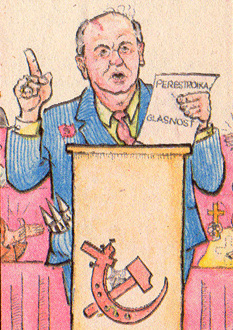 When a student
fails an examination in chemistry or physics, it is not the fault of
chemistry or physics, it is the student's fault. Similarly, just
because all the leaders of the Soviet Union from Nikita Khrushchev to
Mikhail Gorbachev have failed in Marxism-Leninism, one cannot say this
is the fault of Marxism-Leninism. Khrushchev, Gorbachev and all the
Soviet leaders in between applied an ideology to the national and
international conditions which was not Marxism-Leninism. They
themselves described their thinking as "new." In his book Perestroika,
Gorbachev waxes eloquent about his "new thinking" regarding his country
and the world. Either Marxism-Leninism is "old" thinking for him, or he
openly admits that what he presents is not Marxism-Leninism. When a student
fails an examination in chemistry or physics, it is not the fault of
chemistry or physics, it is the student's fault. Similarly, just
because all the leaders of the Soviet Union from Nikita Khrushchev to
Mikhail Gorbachev have failed in Marxism-Leninism, one cannot say this
is the fault of Marxism-Leninism. Khrushchev, Gorbachev and all the
Soviet leaders in between applied an ideology to the national and
international conditions which was not Marxism-Leninism. They
themselves described their thinking as "new." In his book Perestroika,
Gorbachev waxes eloquent about his "new thinking" regarding his country
and the world. Either Marxism-Leninism is "old" thinking for him, or he
openly admits that what he presents is not Marxism-Leninism.
We
cannot either be dogmatic and dismiss Gorbachev merely because he does
not follow Marxism-Leninism or become pragmatic and uphold that truth
is what works. We must bear in mind both principle and concern about
the problems facing the working people nationally and internationally.
Principles and permanent solutions to problems are interrelated. One
cannot exist without another. A solution which lacks a sound basis,
that is principle, is no solution at all. In the same fashion, a
principle cannot be sound if it is merely an abstraction and a moralism
devoid of any relevance to real life. Gorbachev's historical destiny is
that he will fail both in principle, which he had already abandoned,
and in practical terms as well. Each one of the
leaders who came after J.V. Stalin in the Soviet Union talked about how
bad the past had been and bitterly denounced the previous leaders,
promising a brilliant future. When Nikita Khrushchev became leader of
the Soviet Party and state, he condemned the "crimes of J.V. Stalin"
and embarked on a retrogressive path. When I visited the Soviet Union
in April of 1965 -- about six months after the ouster of Khrushchev --
there was an eerie silence about the new leadership. Nobody talked
about Leonid Brezhnev and Alexei Kosygin, who had captured power, but
the atmosphere was created that from now on, "things will be better."
This became the pattern of successive Soviet leaders, and when Mikhail
Gorbachev came to power in 1985 he also said the same thing, and he has
been doing so on a broad scale. According to press reports we receive
here, and according to the documents released by the Soviet official
circles, Mikhail Gorbachev has condemned the past and promised a bright
future. Mikhail Gorbachev has condemned two periods
in Soviet history most vehemently. He condemned the period from
1924-1953, that is, the period of J.V. Stalin. This was the period when
socialism was constructed, when the victory over the Axis powers was
won and the war-torn economy was restored in the short span of just
under eight years. The second period he denounces is the period from
1964-1985, the period of Brezhnev, Kosygin, Chernenko and Andropov. He
calls the latter period one of economic stagnation. He has even
returned to Britain the private property confiscated by the Great
October Revolution! It is not my intention to detail everything
Gorbachev has done, but it is important to find out why he condemns
these two periods. Mikhail Gorbachev calls the
1964-1985 period one of economic stagnation and corruption. But he
fails to find the scientific reason for it. Could it be that the Soviet
leaders of the time were clumsy in capitalist restoration, or that
capitalism itself means stagnation and corruption? As to why he
denounces the period of J.V. Stalin, it is quite clear. He does not
like socialism and the dictatorship of the proletariat and the
uninterrupted revolution in all fields as a means to expand the
material and technical base, as well as to perfect the relations of
production, eliminating private property in a stepwise manner and
strengthening the political power and the role of the masses in running
the state, economy and all spheres of life. The word and deed of
Gorbachev have shown that he is no Marxist-Leninist and no builder of a
socialist and communist society. Far from being its builder, he is the
enemy of such a society. The reason he condemns the
period from 1964-1985 is to throw dust in the eyes of the masses; it is
for demagogic purposes, using the same tactics as his predecessors
between 1953 and 1985. In this way, he thinks he can fool the people
about the causes of economic stagnation and corruption during the
Brezhnev period. But the reality of the Soviet Union since March 5,
1953 the day J.V. Stalin died is one of a consistent, unbroken,
counterrevolutionary thread. Capitalist reforms finally led to economic
stagnation and national conflicts, which prevail at the present time.
Gorbachev wants to create a distance with his predecessors by accusing
them of being "Stalinist," but it does not work. He is caught by the
reality of capitalist reform, of bourgeois liberalization and
bureaucratism. No amount of words or denunciations of the past will be
able to turn the dismal failure into brilliant success. Just
as the bourgeois ideology fails to deal with any problem in capitalist
society, the same is true of the ideology of Mikhail Gorbachev, his
"new thinking," which is a form of bourgeois ideology. Big claims are
being made by both Gorbachev and Reagan, one the head of modern
revisionism and the other the head of imperialism, but there are no
facts to back them up. For example, perestroika and glasnost have not
ended economic stagnation or corruption, nor are they going to. On the
contrary, they will contribute to the further deepening and broadening
of the capitalist offensive and along with it to the deepening of the
crisis in all spheres. It can be said with utmost confidence that
failure is the historical destiny of Mikhail Gorbachev. 
Revolution - October 4, 1989 - 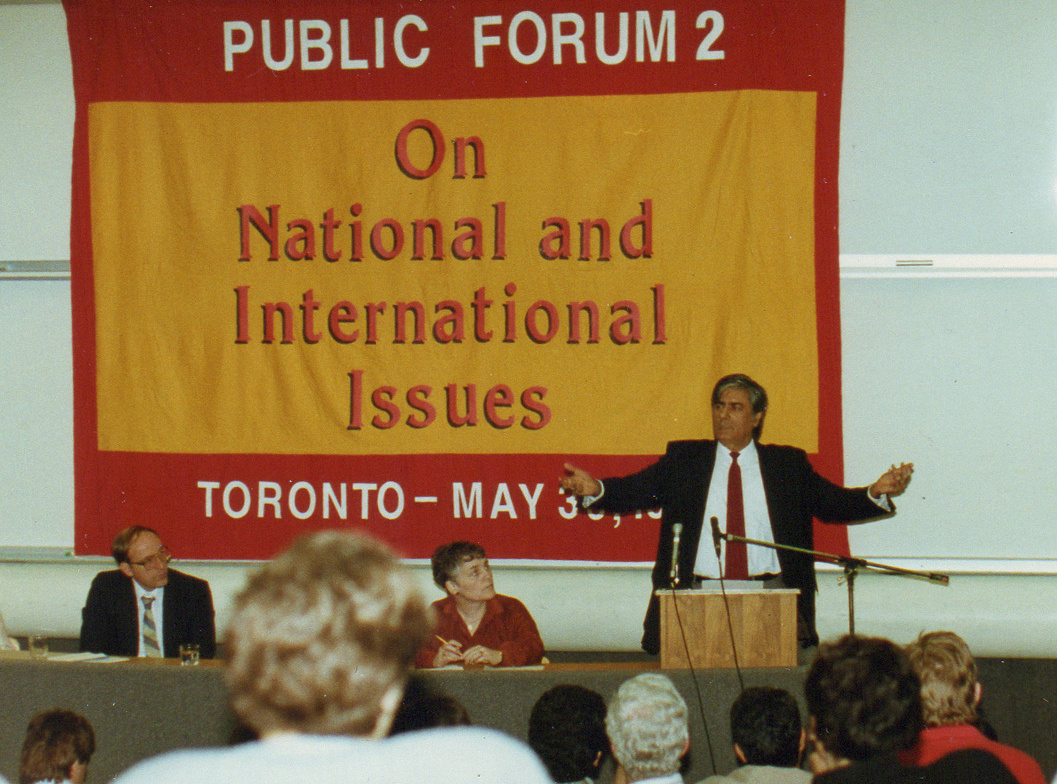
Comrade Hardial Bains
addressing one of two public forums held in Toronto, April 25 and May
30, 1992 to discuss the historical turning point given rise to by the
fall of pseudo-socialism in the Soviet Union.
According
to the Western news services, a revolution is in the making in Eastern
Europe. Eastern Europe actually came into being as a result of a
revolution. What, then, is the kind of revolution they are talking
about which is in the making today? The greatest of all revolutions was
the Great October Revolution, which led to the creation of a new state
of Soviets, or the first proletarian state, a state of the dictatorship
of the proletariat, a democracy of the new type, a proletarian
democracy. All revolutions hitherto had replaced one exploiting class
by another. The Great October Revolution created a society without
exploiting classes, a new society where exploitation of man by man
became a thing of the past. It is being asserted
that a new revolution has broken out in this society, but those who say
so do not tell us what the aim of this revolution is. According to
them, this "revolution" began when Nikita Khrushchev came to power.
But, again, what is its aim? The aim, of course, if one reads between
the lines, or goes by the excitement and euphoria of the capitalist and
imperialist governments, is retrogression; it is to undo the gains of
the Great October Revolution and completely dismantle the socialist
society. How can the aim of a revolution be retrogression? This is
indeed a strange and peculiar kind of revolution we are witnessing
which even defies scientific description, and to describe it, words are
being given a meaning which they do not normally have. This
"revolution" is also strange from another angle. When Soviet power was
established by the Great October Revolution, fourteen imperialist
states militarily intervened to crush it. Winston Churchill called for
the crushing of the baby "in the cradle." Today's "revolution,"
however, is receiving the congratulations of the heads of the same
imperialist states. How did this turn of events come about? Perhaps
because the revolution going on in Moscow today is a continuation of
the counterrevolution started by Nikita Khrushchev. Only
counterrevolution, not revolution, inspires the capitalist and
imperialist states to send flowers and congratulations. A
real revolution leads to the advance of the society, to its vigorous
development and the unprecedented release of human initiative, as
happened in Russia after the Great October Revolution in 1917. Besides
other things, the Soviet Union was industrialized at a record rate, a
phenomenon previously unheard of. The Soviet Union recovered from the
devastation of the Second World War within a matter of a few years,
without receiving any help from any other country and under the
continuous threat of another war being unleashed by the United States.
From 1917 to 1953, Russia provided the example of a triumphant march.
No matter what enemy it faced, it knew no defeat. This was the kind of
revolution the working classes of all countries came to know was a real
revolution. But all the news which came out of
Khrushchev's "revolution," or which today comes out of Gorbachev's
"revolution," is of one disaster after another, one shooting of
demonstrators after another, one split after another, and about how the
crisis continues to deepen and broaden. The penetration of the
influence of the decadent American culture becomes a headline. Another
perfidy, another slander, against J.V. Stalin, or the socialist
society, or another threat against the national minorities, or the
workers, becomes a headline. This is what is coming out of the Soviet
Union today. This is chaos and retrogression, the consequence of
counterrevolution and capitalist restoration. It cannot be called a
revolution. No worker can be inspired to organize and take the road of
this kind of "revolution." The Western press has
the habit of fooling itself, just as it wants to fool its readers.
Toward this end, it calls the developments in the Soviet Union and the
former people's democracies, the "crisis of communism" and its retreat.
But, in actual fact, it is the crisis of modern revisionism, a form of
bourgeois ideology, and the capitalist restoration. The more these
countries follow the path of retrogression or counterrevolution, the
more there will be chaos and crisis, and the only recourse the workers
will have is that of revolution and communism. There is no other way
out of the crisis which is rocking the Soviet Union and other countries.
The Western press has even declared this to be a victory for
capitalism over communism. How can one reach such a conclusion? When
socialism was constructed in the Soviet Union, this was a victory over
capitalism. The retrogression in the Soviet Union, however, is a
setback for the revolution and socialism. It does not prove that
capitalism is right, or that socialism does not work. With countries
like Britain going down the tubes and other capitalist and imperialist
countries in a similar situation, it is hardly a time to celebrate the
victory of capitalism! Even elementary logic is not
adhered to by the Western press. For instance, if a person fails a
physics examination, or abandons his studies in physics, it in no way
means that physics as a science has failed. It only means that, for
some reason, that person failed. Perhaps he was not a good student, or
it was not in his interest to pursue this field of study. Similarly, if
various countries like the Soviet Union have taken the road of
retrogression, the road of counterrevolution, this does not mean that
communism has failed or that capitalism has triumphed. The kind of
economic and other crises which exist in these countries is hardly the
occasion for celebration by world capitalism. It is
quite pathetic and most despicable and self-serving to see the Western
press call revisionists like Gorbachev "Marxist-Leninists." In just the
same way, Adolf Hitler was called a "socialist." They are crowing that
the "Marxist-Leninists" have realized the folly of their ways and are
opting for capitalism. It is like saying that science has finally
realized its folly and now believes that the earth is flat after all,
and that all the heavenly bodies rotate around the earth. In order to
confuse the workers, on one hand, they say that Gorbachev is a
"Marxist-Leninist," on the other hand, they write reams about all the
rotten things Gorbachev does. The fact of the
matter is that all the developments in Eastern Europe show that these
countries suffer from the same ills which affect any capitalist
society. The form may be different, but the content is the same. There
is economic crisis, as in any other capitalist country; there are
political dogfights, as in any other capitalist country; there is
cultural decay and spiritual devastation, as in any other capitalist
country. The fact is that with the Solidarity-backed government in
Poland, everything in that country has remained the same. It shows that
the country was already capitalist when this government took over; the
contradiction between Solidarity and the "communist" government was
merely a dogfight between two bourgeois and reactionary parties.
Retrogression and counterrevolution, on the world scale, are
the official policy of the United States, the Soviet Union and all
reactionary states. They are trying to present this as a "revolution"
in order to fool the people. It is really laughable to see the U.S.
financing counterrevolutionary cutthroats in Central America, while
they pretend to be for "revolution" in Eastern Europe. This does not
fool anyone. The workers are themselves seeing what kind of a society
they live in and what kind of society the capitalists want to establish
in other countries. At the same time, it is important for the workers
to heighten their vigilance and defeat this offensive against
revolution, against freedom and progress which the U.S and the Soviet
Union and other reactionary states are waging. The
world situation is very complicated. Reaction is on the offensive. What
is happening in Eastern Europe, for example, especially in the Soviet
Union, Hungary and Poland, is one front of the offensive of world
reaction for the destruction of revolution and socialism, for changing
the course of history. The revisionists of the Communist Party of
Canada and social-democrats of the New Democratic Party are extremely
happy about this offensive, proving once again that they are despicable
comrades-in-arms of world reaction. The workers must master
Marxism-Leninism in order to ideologically arm themselves for the ever
more complex and decisive battles which lie ahead. Revolution
and retrogression do not mix. The one cannot be part of the other. It
does not matter how many times the developments in Eastern Europe are
presented as being "revolutionary" and "democratic," they will come to
be known by their true names: counterrevolution and retrogression.

Developments
in Russia: The Raising of the Flag -
December 26, 1991 - On
December 25, the Czarist flag minus the Czarist crown was again raised
over the Kremlin, more than seventy years after it was brought down.
Nearly all of the main imperialist countries applauded this development
calling it a victory for freedom and democracy. They also hailed it as
a great advance against totalitarianism, and said that a new world with
no "Cold War" has been created. I find cause for
neither happiness nor sadness in this development. The pseudo-socialist
system which came into being in the Soviet Union following the death of
J.V. Stalin had no hope whatsoever. Whether we speak of the regime of
Nikita Khrushchev, Leonid Brezhnev or Mikhail Gorbachev, it was bound
to fall. This is because it failed to deal with the problems of
socialist revolution and socialist construction. Instead of doing so,
it came into being in the fifties and sixties as a substitute and
alternative to socialist revolution and socialist construction.
Thus, the raising of the Czarist flag over the Kremlin marks
the end of pseudo-socialism, just as the coming to power of Nikita
Khrushchev spelled out the end of socialist revolution and
construction. It signals the victory of capitalism and imperialism over
the cause of revolution and socialism. This is the key thing in the
raising of the Czarist flag over the Kremlin. Furthermore,
the raising of this flag over the Kremlin is the result of the rise of
Russian chauvinism and it increases the danger of a world war. Russia
has openly emerged as an imperialist country for the first time since
the Great October Revolution which took place in 1917. At other times,
from the time of Khrushchev through to the time of Gorbachev, Russia
has concealed its imperialism under the slogans of socialism and
proletarian internationalism. Can it be said that a
country which is now being governed by presidential decree will be
democratic towards the other countries which now comprise the
Commonwealth of Independent States? Will such a country accept and
respect the independence and sovereignty of the other Republics? Will
it respect the independence and sovereignty of other states outside of
the Commonwealth? What has happened in the Soviet
Union is two-fold: 1) Pseudo-socialism has been
overthrown, at least in Russia, raising once again the question of the
necessity for socialism. This is an historical inevitability. From the
time of Nikita Khrushchev in the fifties to that of Mikhail Gorbachev
who took over power in March 1985, it has been quite clear that the
situation could not go on as it was. Khrushchev did not pinpoint where
to take action in order to ensure that the economy would keep growing.
According to him and the others who followed him, the problem was one
of efficiency. They claimed that what was needed was to run the
productive forces better. In actual fact, the economy could not go
anywhere on the basis of the Khrushchevite policy which was to
reshuffle the bureaucracy. This did not and could not release the
initiative of the working people who steadily became apathetic, while
the state, Party, army, police and secret services created their own
class of exploiters. In lieu of the rule of the working people, it
became the rule of the Party, army, police and secret services.
When the capitalist system runs into problems, whether it is
an individual enterprise or the system as a whole, the measure is
invariably taken to shift the burden of the crisis onto the backs of
the workers. The same began to take place in the Soviet Union. Every
reform intensified the exploitation of the working people, comprised of
the working class, peasantry, intelligentsia and others. This was all
done in the name of revolution and socialism. Using the excuse that
socialism is built on the basis of heavy industry, Khrushchev and his
followers began to develop a military and industrial complex which, by
the time Leonid Brezhnev died in 1979, had been fully bankrupted. The
needs of the working people were always put in the last position while
the bureaucracy and the military-industrial complex were put in first
place. These developments were also encouraged by
the imperialist countries who loaned the Soviet Union and its
satellites billions of dollars to finance the bureaucracy and the
military-industrial complex. They coupled this with calls for the
respect of human rights, diverting national and international public
opinion on the issue of what was really happening in the Soviet Union.
While Khrushchev rested his deviation on attacks against Stalin,
according to which Stalin was to be blamed for every real or perceived
problem, Gorbachev rested his policy on the discontent which had
swelled amongst the people in the Brezhnev era. With the Soviet Union
heading for economic bankruptcy, Gorbachev elaborated his plan for perestroika
(restructuring) and glasnost
(openness) to smash the pseudo-socialist system and build a classical
capitalist society. In spite of all his claims about constructing
socialism, Gorbachev was fascinated with the capitalist system and used
the discontent of the people to eliminate the vestiges of socialism
which had become fetters on the unrestricted development of the
capitalist system. 2) Along with strengthening the
bureaucracy and military-industrial complex, Khrushchev and his
followers began to implement their program of Russification by calling
the USSR a "nation," a euphemism for Russia. On this basis, they slowly
and steadily aroused discontent in all the Republics, who saw in the
USSR an oppressor. In this way the final stage in which all the
Republics declared their independence, gave rise to a Russia with the
economic and military superiority, to keep the other Republics in line.
Thus, the demand for Russian independence was to use everything,
especially the economic and military force of the USSR, for the
purposes of destroying the USSR and giving rise to Russia as the most
powerful Republic with all the means to cause trouble and subjugate the
other Republics. Russia has now taken over all the
Soviet embassies abroad and the Soviet seat on the Security Council of
the United Nations. It has now been acknowledged as a "big power,"
which can use its veto in the Security Council not only against other
big powers, but mainly against the other Republics which constituted
the former USSR. The fact that Russia has a seat on the Security
Council and is one of the five permanent members with a veto, along
with Britain, China, France and the U.S., means that Russia can veto
any move by the big powers which may not serve its interests anywhere
in the world. This means that all the Republics which make up the new
Commonwealth of Independent States will have to worry. Russia, like all
the other big powers, can now do whatever it wishes. The
USSR was created on December 30, 1922 as a Union of equal republics.
Any one of the Republics could secede from the Union if it so desired.
From 1953 on, Khrushchev and others called the USSR a "fatherland" in
order to ensure that this Union could be used as a stepping stone for
the resurgence of Russia. It is this policy which has finally created a
Russia which is free to molest any other Republic of the former Soviet
Union, as well as others, because it is no longer contained by the
military might of the USSR, established in the first place to deter
Russian chauvinism from pursuing just such an expansionist and
enslaving path. The basic principle of the Union of Soviet Socialist
Republics was proletarian internationalism -- the fraternal unity of
the peoples in defence of each and everyone's interest. This is why, so
long as this policy was pursued, the Republics flourished and stood
together. This was the case until the policy of Russification took hold
after Khrushchev came into power. There is another
factor which will weigh heavily on future developments: the factor of
the ex-satellites. These countries prior to the Second World War, with
the exception of Yugoslavia, had constituted a cordon sanitaire
against the USSR. Several of them invaded the USSR on the side of
Hitler Germany. After the victory of the USSR over Germany, these
countries fell under Soviet influence and people's democracies were
established there. In 1955, Khrushchev established a military alliance
with them at a time the military-industrial complex began to be
established. This alliance, known as the Warsaw Pact, is now disbanded.
These countries are no longer satellites of the USSR or Russia.
Present-day Russia, with all its economic and military might, will have
to establish new relations in the face of the other big powers. Besides
conflicts with other Republics, friction is bound to develop with the
countries which encircle Russia. Old Russia had a long history of
aggression and war against its weaker neighbours. 
(To
access articles individually click on the black headline.) PDF
PREVIOUS
ISSUES | HOME
Website:
www.cpcml.ca Email: office@cpcml.ca
|

